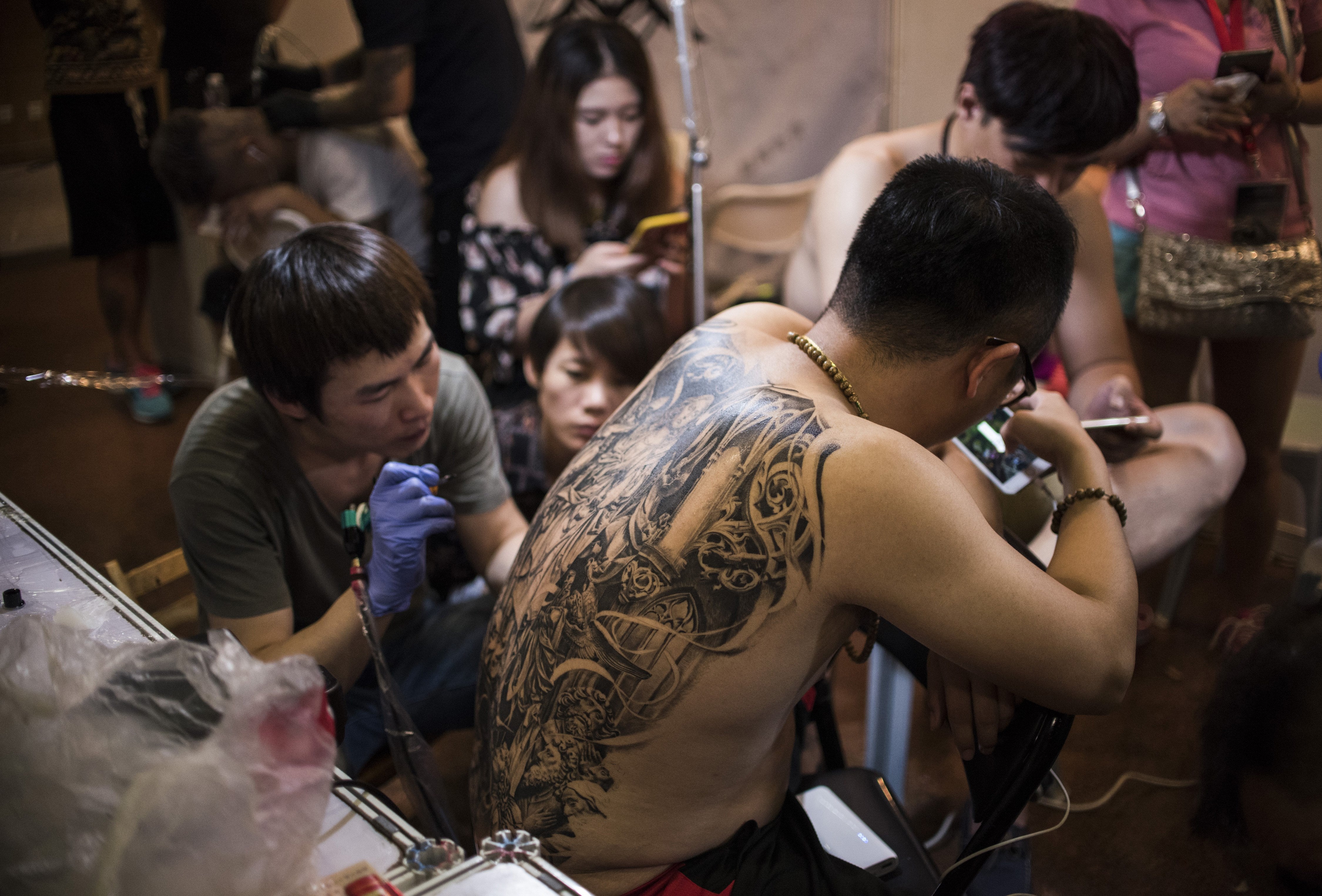‘Simply discriminatory’: Chinese city orders taxi drivers to remove tattoos
Cabbies are being ordered to undergo painful and expensive tattoo – to ‘protect women and children’, writes Tiffany May

Taxi drivers in a northwestern Chinese city recently received an unusually blunt government directive: get rid of your tattoos.
The order came in August as transport officials in Lanzhou, the capital of Gansu province, rolled out a campaign to spruce up the image of local cab drivers. Ostensibly, the no-tattoo rule was meant to keep some passengers from feeling uncomfortable.
It also coincided with nationwide efforts to dampen the growing popularity of tattoos among younger generations, who are increasingly embracing the once-stigmatised body art.
But one driver in Lanzhou wanted to keep the ink and took to an online government forum to deliver a polite, but pointed, rebuttal to the city’s order.
“When applying for our driver permit, we submit documents showing that we have no criminal records,” wrote the driver, who was not identified in the post and could not be reached for comment. “Our tattoos don’t turn us into bad guys and criminals.”
The driver noted that removing tattoos was painful and expensive, requiring repeat visits to scrub traces of permanent ink from the skin through laser technology. The process can also leave scars and faded patches of colour.
The government’s order was simply discriminatory, the driver said.
But in a public response in September, Lanzhou’s transport committee did not budge. Without offering evidence, it said that “large tattoos on drivers may cause distress to passengers who are women and children”.
The committee also insisted that “drivers who already have tattoos should remove them through surgical procedures to the greatest extent possible”.
It was unclear how the tattoo removal would be enforced or who would pay for it. When reached by telephone on Tuesday, representatives of the Lanzhou government declined to comment.
The committee’s response to the driver was widely reported across China, reviving an age-old debate in a country where tattoos are being increasingly embraced by younger Chinese but are still shunned by those who consider them a mark of criminality.
Tattoo culture began to flourish in China as the country opened up to the west ahead of the Beijing Olympics in 2008. Western influences and pop culture resonated with Chinese audiences. More entertainers and athletes began displaying tattoos in televised appearances, including Lin Dan, a badminton Olympic champion who bared his ink-stained arms during competitions.
Tattoo parlours, schools and conventions multiplied. Some tattoo artists, such as Chen Jie and Joey Pang, pioneered a style that evokes Chinese ink paintings with watercolour-like strokes. Others were influenced by a delicate new style of South Korean mini-tattoos, distinguished by pinprick-thin outlines and pastel colours.
Although he respected the art of tattooing, he would become nervous if a tattooed driver took a turn down a deserted road
In Japan, where tattoos have long been associated with organised crime syndicates like the yakuza, regulations on tattooing have gradually loosened. Many bathhouses and hot springs still bar tattooed visitors in an attempt to exclude gang members. But in a boon for tattoo parlours and practitioners, the country ruled last week that tattooing did not require a medical license.
In China, the increasing acceptance of tattoos has been resisted by conservative gatekeepers. Television censors blurred images of tattoos, as well as cleavage and men’s earrings, in 2017 and in 2019. And Chinese sports officials ordered soccer players with tattooed arms to wear long sleeves during the Asian Cup in the United Arab Emirates last year.
Lanzhou’s directive may be among the most harsh for taxi drivers.
Changchun, a Chinese city in the northeastern province of Jilin, recently issued its own ban on tattoos for cabdrivers — but merely told them to cover them up, not to remove them. (It also told drivers not to smoke, to keep their vehicles clean and to turn on the air conditioning while ferrying passengers.)
The driver in Lanzhou who went public with discontent said that Changchun’s approach was preferable and suggested that the local government modify its directive.
“I understand that our leaders want to present our industry in a more positive light,” the driver wrote. “The purpose of telling us to remove our tattoos is so that our passengers don’t see them. Covering them up achieves the same result.”
After the pushback, Lanzhou’s transportation committee said that drivers could hide large tattoos on their arms and necks but suggested that it would be a temporary solution.
“Those who are unable to remove them completely for the time being should cover them up,” the committee said in its reply to the driver.
Other online reaction to the episode has been mixed. In an informal poll on social media asking 3,000 women whether they would ride with taxi drivers sporting tattoos, 850 said they would, and 1,000 said they would not.
A male internet user said on Weibo, a Chinese microblogging platform, that although he respected the art of tattooing, he would become nervous if a tattooed driver took a turn down a deserted road.
Some said the Lanzhou rule simply reflected outdated stereotypes about tattoos. A 29-year-old internet user in Wuhan, Diane Yang, wrote on Weibo: “If the higher-ups don’t like the look of tattoos, please don’t use women as an excuse. Tattoos should not be considered the manifestations of ill intentions.”
“It’s very normal,” Li Mingjun, a 21-year-old student in Beijing, said in an interview about body ink. “You can’t stop someone from making a living just because of a personal preference.”
She said she wanted a tattoo for herself.
© The New York Times




Join our commenting forum
Join thought-provoking conversations, follow other Independent readers and see their replies
Comments